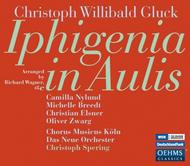Braunfels - Orchestral Songs Vol.2
£11.38
Usually available for despatch within 2-3 working days
Despatch Information
This despatch estimate is based on information from both our own stock and the UK supplier's stock.
If ordering multiple items, we will aim to send everything together so the longest despatch estimate will apply to the complete order.
If you would rather receive certain items more quickly, please place them on a separate order.
If any unexpected delays occur, we will keep you informed of progress via email and not allow other items on the order to be held up.
If you would prefer to receive everything together regardless of any delay, please let us know via email.
Pre-orders will be despatched as close as possible to the release date.
Label: Oehms
Cat No: OC1847
Barcode: 4260330918475
Format: CD
Number of Discs: 1
Genre: Vocal/Choral
Release Date: 30th September 2016
 FREE UK SHIPPING OVER £30!
FREE UK SHIPPING OVER £30!
 There’s very little stylistic distance between the earliest of the five song-cycles for soprano and orchestra here – the Three Chinese Songs of 1914, settings of translations by Hans Bethge from the same collection that Mahler had quarried a few years earlier for Das Lied von der Erde – and the last – the Four Japanese Songs from 1945, again to Bethge texts. The later works don’t have the lyrical freshness of the Chinese Songs, which Camilla Nylund’s wonderfully refined performance reveals as a neglected treasure. Nylund also sings the five Romantic Songs – settings of Brentano and Eichendorff which Braunfels began during the first world war and completed during the second.
There’s very little stylistic distance between the earliest of the five song-cycles for soprano and orchestra here – the Three Chinese Songs of 1914, settings of translations by Hans Bethge from the same collection that Mahler had quarried a few years earlier for Das Lied von der Erde – and the last – the Four Japanese Songs from 1945, again to Bethge texts. The later works don’t have the lyrical freshness of the Chinese Songs, which Camilla Nylund’s wonderfully refined performance reveals as a neglected treasure. Nylund also sings the five Romantic Songs – settings of Brentano and Eichendorff which Braunfels began during the first world war and completed during the second. 



